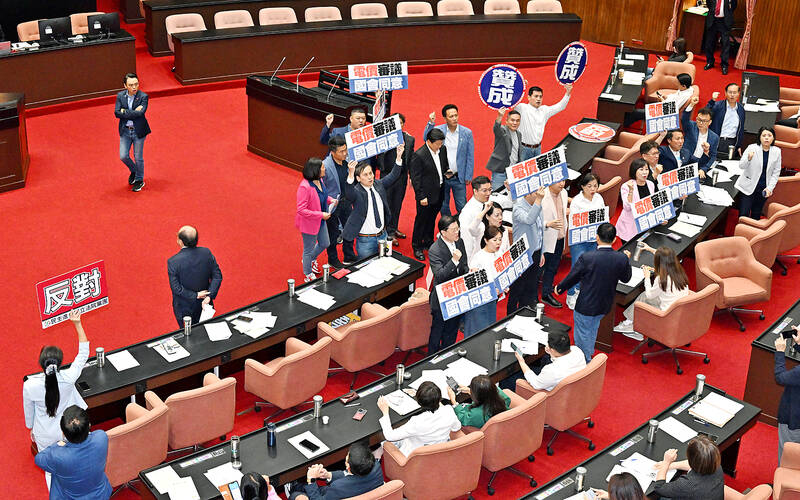The Chinese Nationalist Party (KMT) and the Taiwan People’s Party (TPP) yesterday voted against a proposed bill by Democratic Progressive Party (DPP) lawmakers that would require elected officials to seek approval before visiting China.
DPP Legislator Puma Shen’s (沈伯洋) proposed amendments to the Act Governing Relations Between the People of the Taiwan Area and the Mainland Area (臺灣地區與大陸地區人民關係條例), stipulate that contact with certain individuals in China, Hong Kong and Macau should be reported, while failure to comply would be punishable by prison sentences of up to three years, alongside a fine of NT$10 million (US$309,041).
Fifty-six voted with the TPP in opposition to the bill and 49 for, sending the proposal back to the Procedural Committee.

Photo: Tien Yu-hua, Taipei Times
Shen said that he had expected this from the KMT, but had not anticipated the TPP aiding the KMT.
The TPP was not just the KMT’s lackey, but was also helping the Chinese Communist Party prevent the DPP from closing loopholes which would help safeguard national security, DPP Legislator Hung Sun-han (洪申翰) said.
TPP Legislator Chen Gau-tzu (陳昭姿) said that the proposed amendments were rough around the edges and she was solidly against double standards.
Chen, who is known for her pro-Taiwanese independence stance, said she had once been a DPP supporter, but the party has demonstrated that it was prone to forgetting promises.
Chen asked whether DPP members were all on board with the proposed amendment, citing visits to China by Minister of Economic Affairs Wang Mei-hua (王美花) and Presidential Office Secretary-General Lin Chia-lung (林佳龍) when they were head of the Taiwan Intellectual Property Office and Taichung mayor respectively, as well as Vice Premier Cheng Wen-tsan’s (鄭文燦) visit to Macau.
In other developments, opposition lawmakers yesterday used their majority in the legislature to send a proposed amendment giving lawmakers the final say in electricity prices directly to a second reading. It passed with a 58-51 vote.
The proposed revision to Article 49 of the Electricity Act (電業法) requires electricity rate changes by the Ministry of Economic Affairs’ power price review committee to be submitted to the Legislature for approval, or it cannot be implemented.
Legislation must pass three readings to become law. In the first reading, the titles of proposed bills are read out loud and then referred to the appropriate committees for review before being sent to a second reading. If a motion is seconded by at least 20 lawmakers and passes a vote, it could be sent straight through to the second reading without being referred to a committee for examination.
The amendment came after the government on Tuesday said that the electricity rate hike for last month would not be changed, despite a resolution passed by lawmakers to freeze the policy.
The opposition yesterday also sent a proposed amendment to the Securities and Exchange Act (證券交易法), which said that listed companies must share their surplus profits with employees in the form of additional wages, directly to a second reading.

Japanese footwear brand Onitsuka Tiger today issued a public apology and said it has suspended an employee amid allegations that the staff member discriminated against a Vietnamese customer at its Taipei 101 store. Posting on the social media platform Threads yesterday, a user said that an employee at the store said that “those shoes are very expensive” when her friend, who is a migrant worker from Vietnam, asked for assistance. The employee then ignored her until she asked again, to which she replied: "We don't have a size 37." The post had amassed nearly 26,000 likes and 916 comments as of this

US President Donald Trump said "it’s up to" Chinese President Xi Jinping (習近平) what China does on Taiwan, but that he would be "very unhappy" with a change in the "status quo," the New York Times said in an interview published yesterday. Xi "considers it to be a part of China, and that’s up to him what he’s going to be doing," Trump told the newspaper on Wednesday. "But I’ve expressed to him that I would be very unhappy if he did that, and I don’t think he’ll do that," he added. "I hope he doesn’t do that." Trump made the comments in

Tourism in Kenting fell to a historic low for the second consecutive year last year, impacting hotels and other local businesses that rely on a steady stream of domestic tourists, the latest data showed. A total of 2.139 million tourists visited Kenting last year, down slightly from 2.14 million in 2024, the data showed. The number of tourists who visited the national park on the Hengchun Peninsula peaked in 2015 at 8.37 million people. That number has been below 2.2 million for two years, although there was a spike in October last year due to multiple long weekends. The occupancy rate for hotels

A cold surge advisory was today issued for 18 cities and counties across Taiwan, with temperatures of below 10°C forecast during the day and into tonight, the Central Weather Administration (CWA) said. New Taipei City, Taipei, Taoyuan and Hsinchu, Miaoli and Yilan counties are expected to experience sustained temperatures of 10°C or lower, the CWA said. Temperatures are likely to temporarily drop below 10°C in most other areas, except Taitung, Pingtung, Penghu and Lienchiang (Matsu) counties, CWA data showed. The cold weather is being caused by a strong continental cold air mass, combined with radiative cooling, a process in which heat escapes from